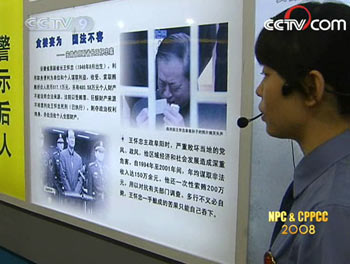The fight against corruption has been the center of the government's attention over the past few years. This was especially true recently, when China achieved new breakthroughs in this area.
|

|
|
Corruption is a matter of life and death in China. The Communist Party vows to punish corrupt officials, no matter how important the positions they hold. |
Corruption is a matter of life and death in China.
The Communist Party vows to punish corrupt officials, no matter how important the positions they hold.
Between 2003 and June of 2007, the government has investigated 160,000 corruption cases across the country.
Most of the officials were sacked for engaging in exchanges of influence for money, sex, and gifts.
One of them is Zheng Xiaoyu, former director of the State Food and Drug Administration. He was sentenced to death in May last year, and was executed about two months later.
The former food and drug security chief was found guilty of taking nearly 6.5 million yuan in bribes and dereliction of duty.
His execution is the first time China has imposed a death sentence on an official of his rank since 2000.
However, corruption can not be eradicated solely through punishment---mechanism that also combines prevention is crucial.
In September, 2007, the National Corruption Prevention Bureau was established. The new agency is the answer to a UN Convention China signed in 2005. It will help the country learn from the experience of the international community.
Ma Wen, director of Nat'l Corruption Prevention Bureau, said, "The founding of the bureau is a significant step by the Communist Party of China, to meet the need to effectively prevent corruption in China.”
The bureau is the only state-level one of its kind. It will study ways to stem corruption at the roots, improve prevention and coordinate the corruption prevention efforts of various departments.
Meanwhile, authorities are working hard to eradicate environments where corruption is relatively easy to hide. Government procurement is now being moved to open bidding. Any changes in the permitted use of land is also open to the public.
These measures reduce opportunities for officials to be involved in under-the-table business.
Prof. Cheng Wenhao of School of Public Management, Tsinghua Univ., said, "Many of the suspects in these corruption cases committed their crimes many years ago. Nowadays, corrupt officials have to bear much more risk once they start their evil affairs. Public surveys on the people's reaction to the anti-corruption drive shows their satisfaction is increasing."
Experts say it's the responsibility of the entire country to form a clean environment where corruption is difficult to engage in, and the government will continue its high pressure policy against it.
(CCTV March 10, 2008)